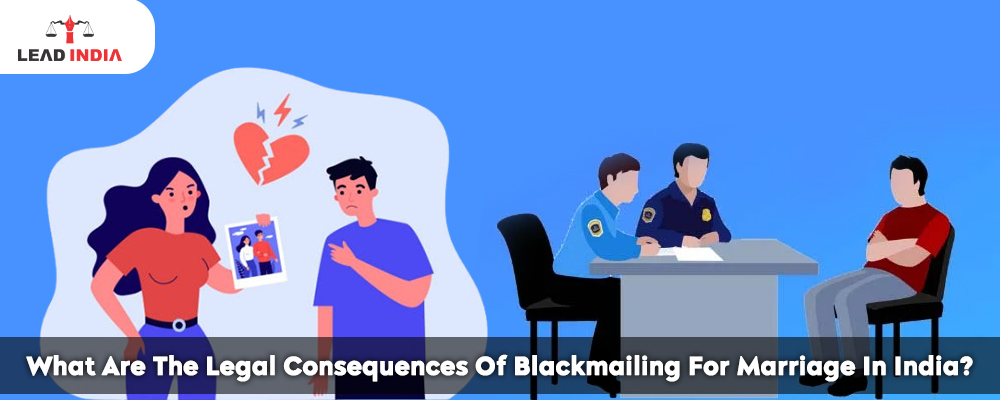Blackmailing a person to marry is a heinous crime against personal independence and is highly harmful to society. Laws in India that provide for the coercion of marriage include the Bharatiya Nyaya Sanhita, 2023 and Indian contract Act, 1872. Marriage is one of the most crucial social contracts, entered into freely and willingly by one and both parties. However, blackmailing and coercion at the time of marriage give a wrong impression about marriage institutions. Blackmail takes the form of emotional blackmail, monetary or financial blackmail, or even social blackmail in India, as marriages are largely a result of social obligations and pressures from family.
What Is Blackmail?
Blackmailing is extortion where a person threatens to reveal harmful or threatening information against another person unless the victim agrees to meet his demands. In marriage, blackmailing will usually encompass threats to expose personal information or to harm the victim and his family if they refuse to marry.
What Is The Effect Of Coercion In Marriage?
Coercion is a situation whereby a party is coerced into marriage against their will. It can be manifested in terms of physical threats, the threat of mental manipulation, or emotional blackmail. The principle of consent in marriage is also very important, and in any case where there is a use of coercion, that consent is null and void.
Need A Legal Advice
The internet is not a lawyer and neither are you. Talk to a real lawyer about your legal issue

What Are The Laws Which Can Help Against The Blackmailing For Marriage?
The BNS has several provisions on the issue of coercion and blackmail:
- Under section 308, a person shall be liable for extortion, if they put a person in fear of injury and dishonestly induce them to deliver the property. So, it is also applied to blackmailing because under this a person is compelled and in a fear of injury for marriage.
- Under section 351, a person is liable for criminal intimation if it deals with offences of threatening to cause apprehension to another person.
- Under Section 296 Obscene Acts and Songs: In case the blackmail used obscenities or carried out obscene actions, this section may also be applied.
The Indian Contract Act, 1872
Any type of contract, including marriage, should be based on free consent. Section 10 of the Indian Contract Act states that an agreement is considered to be void when consent is obtained by coercion. In this regard, it can be established that when a marriage is entered under duress or under blackmail, it can be declared null and void.
Case Law
M. S. Ahlawat v. State of Haryana AIR 2000, under this case, the court held that forcing someone into marriage would violate the fundamental rights of the person.
Legal Redress for Victims
The Blackmail victims have a choice to take legal action against blackmailer of marriages are as follow:
- Filing of an FIR by the victims: FIR can be file by the Victim against the blackmailing under the Bharatiya Nagarik Suraksha Sanhita, 2023
- Seeking a restraining order: As victims have been allowed to seek protection orders on their behalf for protection against potential acts of the crime under consideration.
- Civil Remedies: The victims may also file civil suits seeking damages or for restitution in respect of emotional distress suffered because of coercion.
What are the roles of NGOs and other social groups?
There are various NGOs and social groups that help to assist the victims of domestic violence and coercion. Such organisations offer legal assistance, counselling, as well as shelter, and are therefore an important factor in helping the victim determine their choices.
Conclusion
Blackmailing someone into marriage is a violation of personal and fundamental rights, with greater criminal and legal implications within the Indian legal system. The existing law structure provides various protections against such forms of coercion and speaks to the importance of free consent in marriage. However, deeper societal attitudes and cultural forces that are involved in this issue remain a problem even after legal ways for recourse are available. Changes in consciousness and strengthening of protective legal provisions will be important in fighting this problem effectively. Together with legal reforms, educational programs may even empower the people enough to stand against coercive practices, thus fighting against their right to choose their spouse freely. In the concluding words, blackmail in marital matters should not be taken lightly, and working as a single unit would create a feeling of respected and protected self-sufficiency of human personality.
One can talk to a lawyer from Lead India for any kind of legal support. In India, free legal advice online can be obtained at Lead India. Along with receiving free legal advice online, one can also ask questions to the experts online free through Lead India.




